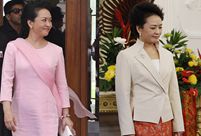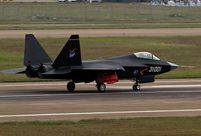 Close-up view of August Aerobatic Team
Close-up view of August Aerobatic Team
 Goddesses married in 2014
Goddesses married in 2014
 Polar region photos raise worldwide awareness of global warming
Polar region photos raise worldwide awareness of global warming
 Get off at the last stop — Beijing Subway in vision
Get off at the last stop — Beijing Subway in vision
 Top 100 beauties in the world!
Top 100 beauties in the world!
 Gallery: Who is the most beautiful one?
Gallery: Who is the most beautiful one?
 If you like autumn, put your hands in the air!
If you like autumn, put your hands in the air!
 Fan Bingbing's "Queen style" in new play
Fan Bingbing's "Queen style" in new play
 Lingerie show at 2014 Miss China
Lingerie show at 2014 Miss China
 J-10 fighters show aerobatic stunts in smog-free sky
J-10 fighters show aerobatic stunts in smog-free sky
SHIJIAZHUANG, Dec. 11-- North China's Hebei Province, a very dry region, is promoting water-saving agriculture and improved urban water supplies.
A differential pricing scheme for tap water will come into force for urban residents in Hebei next year, said Zhang Tielong, deputy head of the Hebei Water Resource Department. Urban households will pay more if the volume of tap water they use exceeds the basic allowance.
By February next year, the province will have invested 7.4 billion yuan (1.2 billion U.S. dollars) in water saving irrigation, which can reduce groundwater exploitation by 760 million cubic meters.
Agriculture accounts for more than 70 percent of water use in Hebei.
Hebei will cut excessive industrial capacity in iron and steel, cement and glass, all major consumers of water.
Currently, more than 90 percent of urban households in Hebei have water saving instruments.
The usable water resource in Hebei is about 15 billion cubic meters each year, about 5 billion cubic meters short of the requirement. The per-capita water resource in Hebei is 307 cubic meters, or one seventh of the average level in the country.
Groundwater has been over-exploited for years on over 67,000 sq km in Hebei, one third of the total over-exploited area in the whole country.
Wetlands in Hebei have shrunk by 70 percent compared with the 1950s.
More than 5.6 million rural people still face drinking water safety problems and drought causes temporary difficulties for half a million in Hebei each year.
Projects diverting water from the Yangtze and Yellow rivers, the country's longest and second longest, will ease Hebei's water shortage, but cannot completely solve the problem, according to the official.
(For the latest China news, please follow @PDChina on Twitter at http://www.twitter.com/PDChina and @PeoplesDaily on Facebook at http://www.facebook.com/PeoplesDaily)
 20 years on: Relocated Three Gorges residents through lens
20 years on: Relocated Three Gorges residents through lens PLA HK Garrison veterans leave behind beautiful smiles
PLA HK Garrison veterans leave behind beautiful smiles Representative beauties of each province in China
Representative beauties of each province in China Chestnut girl goes viral online
Chestnut girl goes viral online Victoria's Secret Fashion Show
Victoria's Secret Fashion Show In photos: Bright and brave female soldier of PLA
In photos: Bright and brave female soldier of PLA China's charming first lady
China's charming first lady Excellent photos of Zhuhai Air Show
Excellent photos of Zhuhai Air Show China's heavyweight aircraft
China's heavyweight aircraft An old problem
An old problem Despite torture report, US escapes censure
Despite torture report, US escapes censure  Inflation hits five-year low
Inflation hits five-year low Runaway brides
Runaway bridesDay|Week|Month